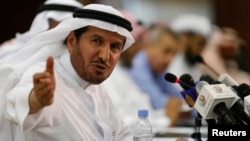RIYADH —
Saudi Arabian King Abdullah removed Health Minister Abdullah al-Rabeeah from his post on Monday as the kingdom grapples with a worrying surge of new cases of the SARS-like Middle East Respiratory Syndrome (MERS). His duties will be taken over by Labor Minister Adel Fakieh, who keeps his current post, state television reported.
The television channel cited the king's royal decree in its report but gave no reason for the switch.
Rabeeah, who on Sunday told a televised news conference there was no medical reason to impose stricter preventative measures against the spread of MERS, has been made an adviser to the Royal Court, the decree said.
Saudi Arabia has reported 244 cases of MERS since the disease was identified in 2012, of which 79 have been fatal. The spread of new infections slowed during the winter, but there has been a sudden increase in cases this month.
The 49 confirmed infections announced over the past week, mostly in the port city of Jeddah, represent a four-fold increase in the total number of confirmed cases since the outbreak began.
The authorities have at times struggled to counter swirling rumors on social media that they have not been transparent about how far the disease has spread and how effective are the preventative measures taken in hospitals.
Last week the cabinet told Saudi news outlets to report only those cases that had been officially confirmed in laboratory tests by the Health Ministry.
On Sunday, Rabeeah said he thought the sudden spurt of new cases in Jeddah might have a seasonal cause, given there was also an uptick in infections about a year ago, but added that he had "no idea" why that might be.
The television channel cited the king's royal decree in its report but gave no reason for the switch.
Rabeeah, who on Sunday told a televised news conference there was no medical reason to impose stricter preventative measures against the spread of MERS, has been made an adviser to the Royal Court, the decree said.
Saudi Arabia has reported 244 cases of MERS since the disease was identified in 2012, of which 79 have been fatal. The spread of new infections slowed during the winter, but there has been a sudden increase in cases this month.
The 49 confirmed infections announced over the past week, mostly in the port city of Jeddah, represent a four-fold increase in the total number of confirmed cases since the outbreak began.
The authorities have at times struggled to counter swirling rumors on social media that they have not been transparent about how far the disease has spread and how effective are the preventative measures taken in hospitals.
Last week the cabinet told Saudi news outlets to report only those cases that had been officially confirmed in laboratory tests by the Health Ministry.
On Sunday, Rabeeah said he thought the sudden spurt of new cases in Jeddah might have a seasonal cause, given there was also an uptick in infections about a year ago, but added that he had "no idea" why that might be.





